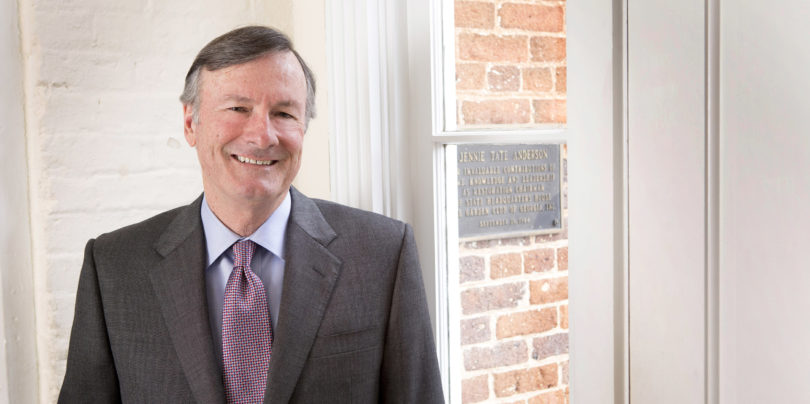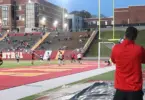William Lee, a professor of journalism in the Grady College of Journalism and Mass Communication, helps students to understand the role of free expression in a democratic society. Lee’s research on the First Amendment appears in top legal journals and is widely cited by scholars, courts and government agencies.
Where did you earn degrees and what are your current responsibilities at UGA?
I earned my Ph.D. in mass communications from the University of Wisconsin-Madison, my master’s degree in telecommunications from Michigan State University and my bachelor’s degree in broadcasting from San Jose State University.
I teach two sections of “Communication Law.” I am also completing a manuscript on former U.S. Supreme Court Justice Lewis Powell, utilizing his papers at Washington and Lee University and the papers of other justices housed at the Library of Congress.
When did you come to UGA and what brought you here?
I came to UGA in 1977. Scott Cutlip, Grady’s dean at that time, specifically wanted me to work with law professor Dean Rusk on a joint Grady-Law School First Amendment conference. So, just a few weeks after defending my doctoral dissertation I was collaborating with a former secretary of state. Sitting in Rusk’s office was amazing; on the wall behind his desk were Norman Rockwell portraits of JFK and LBJ, personally inscribed by those presidents. Our conversations were often interrupted by phone calls from prominent world leaders. Even though he was accustomed to dealing with historic figures, he always treated me, a newly minted Ph.D., with great respect. Working with Dean Rusk was quite a change from my life as a graduate student.
What are your favorite courses and why?
I teach a large lecture section of “Communication Law.” I also teach a small Honors section of the same course. Although the content in both classes is the same, the classes are completely different. The large lecture class has a unique energy. To command and hold the attention of 140 students requires that I be larger-than-life. In contrast, the Honors class requires a subtle hand. In the Honors course I like to provoke discussion and encourage everyone to participate. Since communication law always has new cases and statutes to discuss, I regularly bring these developments into the classroom. Thus, my classes have a “ripped from the headlines” quality.
What interests you about your field?
Communication law raises fascinating questions about the problems posed by free speech, such as the relationship between Congress and the courts, and how evolving social attitudes affect the ebb and flow of protection for free expression. The resolution of the conflict between free expression and other social values is fundamental to the very fabric of our society.
What are some highlights of your career at UGA?
I’m not going to provide the typical C.V.-based answer here. Instead, I will provide some examples of the connection I have with my students. I am known for using memorable phrases. One student, Courtney Baker compiled all the distinctive phrases I used in “Communication Law” in the winter 1998 quarter and then created an exquisitely detailed ink drawing. In the center is “Rock On!” surrounded by other phrases such as “No! No! No!” I had it framed and it is one of my prized possessions. More recently, Jeannette Kazmierczak compiled all the distinctive phrases used in “Communication Law” in the fall 2013 semester and turned them into a “found poem” which she presented to the class. Perhaps the highlight is the phrase, “Where was I before I so rudely interrupted myself?”
Also, I will always remember the first time a student exclaimed “Dr. Lee, you taught my mother!” The student, Tova Fruchtman, later sent me a photograph captioned “The Law of Public Communication from generation to generation.” The photo shows Tova, her mother, an aunt and a cousin, all of whom I taught. Tova’s baby, Penina, is also in the picture clutching the textbook I co-author. They want me to stay at UGA until I can teach Penina.
How does your research or scholarship inspire your teaching, and vice versa?
Much of my research deals with recurring issues, such as journalist’s privilege. So, if we are talking about a contemporary instance of a reporter refusing to reveal her source, I’ll bring in my work on journalist’s privilege. If a news story prompts a discussion of leaking, I will refer to my work on leaking. Virtually every class session gives me the opportunity to draw upon my research.
On the other side, there are often times that students or a class discussion prompts my interest in a topic. Whether it results in a journal article or an addition to our book (“The Law of Public Communication,” co-authored with my Grady colleague Kent Middleton), I like finding the answer to questions.
What do you hope students gain from their classroom experience with you?
I approach my classes with intensity and passion. I want students to understand the role of free expression in a democratic society. I encourage them to develop their own ideas and to challenge existing legal frameworks. From this, I hope they will engage in a lifelong conversation about freedom of expression. I love it when former students contact me about a new Supreme Court decision and offer their take on the issues.
Describe your ideal student.
My ideal student is hard-rocking, fearless in the face of conformity and willing to challenge orthodoxy. I subscribe to the maxim of Thomas Edison who said that his inventions were 1 percent inspiration and 99 percent perspiration. My ideal student recognizes that quality scholarship requires hard work.
Favorite place to be/thing to do on campus is…
Founders Memorial Garden. I also love the library.
Favorite book/movie (and why)?
Really? It would take too much space to adequately answer this question. But I will list two books that offer powerful insight into the South and its distinctive musical genres. The first is “Satan Is Real: The Ballad of the Louvin Brothers,” a haunting story of the forces that shaped the influential duets of Ira and Charlie Louvin. The second is “The One,” a biography of James Brown, a seminal figure whose musical legacy is often overshadowed by his personal demons. I’m looking forward to reading Rick Bragg’s biography of Jerry Lee Lewis, another tortured Southern soul who turned his religious torment into some of the most fervent rock and roll.
I have wide-ranging interest in film, but I will list three films with classic teaching scenes or themes: 1. “Horse Feathers,” in which Groucho Marx brings total anarchy into a classroom; 2. “Back to School,” in which Sam Kinison imitates me; and
3. “The Big Lebowski,” in which the Dude teaches us the importance of, well, being a dude.
Proudest moment at UGA?
When a student, Michael Koch, wrote a song about me (“My Friend Billy Lee”) and then performed it in class. What could top that?
Is there anything else you’d like to add?
Rock On!
Originally published Feb. 15, 2015








